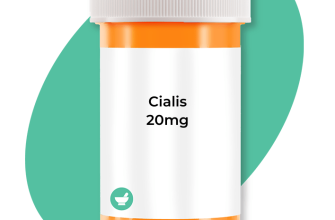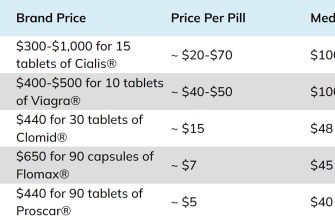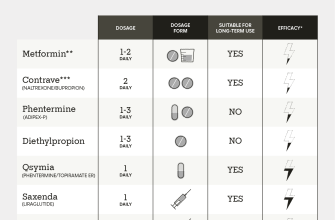Make informed decisions when purchasing Clomid. Start by consulting a healthcare professional to determine if this medication is right for you. Clomid, or clomiphene citrate, is commonly prescribed to stimulate ovulation in women struggling with fertility issues. Understanding your specific needs will help guide your next steps.
Choose a reputable pharmacy for your purchase. Look for licensed online pharmacies that require a prescription. This ensures you’re receiving genuine medication and protecting your health. Check for customer reviews and verify the pharmacy’s credentials to avoid potential scams.
Consider the cost of Clomid as well. Prices can vary significantly between pharmacies. Use price comparison tools and inquire about any available discounts or patient assistance programs. Affordable options may exist that ensure you don’t compromise on care.
Stay informed about potential side effects. Clomid can cause mood swings, headaches, and visual disturbances in some users. Knowing what to expect helps you monitor your body’s reaction and contact your doctor if necessary.
Following these steps creates a smoother experience in your Clomid purchasing process, putting you closer to achieving your fertility goals.
- Buying Clomid: A Practical Guide
- Understanding Clomid: What It Is and How It Works
- Prescription Requirements for Clomid: What You Need to Know
- Where to Purchase Clomid: Navigating Online and Local Pharmacies
- Cost Considerations: Budgeting for Clomid Treatment
- Additional Expenses
- Long-term Budgeting
- Safety and Side Effects: What Buyers Should Be Aware Of
Buying Clomid: A Practical Guide
Consult a healthcare provider to obtain a prescription for Clomid. This medication is often used to treat infertility in women by inducing ovulation. Your doctor will evaluate your medical history and recommend the appropriate dosage.
Purchase Clomid from licensed pharmacies to ensure the quality of the medication. Avoid unverified online sources, as they may sell counterfeit products. Check for pharmacy accreditation and verify their legitimacy.
Consider using local pharmacies or well-known online pharmacies that require a prescription. This increases the likelihood of receiving genuine Clomid and provides access to professional guidance if needed.
Compare prices at different pharmacies to find the best deal. Some pharmacies offer discounts or patient assistance programs that can reduce costs. Additionally, inquire about generic versions of Clomid, which may be more affordable.
Plan your purchase around your ovulation cycle for optimal timing. Clomid typically needs to be taken for five days at the beginning of your cycle. Follow your healthcare provider’s instructions carefully for the best results.
Monitor for side effects while taking Clomid, such as hot flashes or mood swings. Report any severe reactions to your doctor promptly. Regular follow-up appointments can help monitor your progress and make necessary adjustments to your treatment.
Stay informed about your fertility and treatment options. Joining support groups or forums can provide valuable insights from others who have used Clomid and can answer questions you may have along the way.
Understanding Clomid: What It Is and How It Works
Clomid, or clomiphene citrate, is a medication primarily used to treat infertility in women who do not ovulate regularly. It acts as a selective estrogen receptor modulator, stimulating the hypothalamus to release hormones that encourage the ovaries to produce more eggs.
This medication is typically taken in pill form for five days, usually starting on the fifth day of a woman’s menstrual cycle. By enhancing the levels of follicle-stimulating hormone (FSH) and luteinizing hormone (LH), Clomid promotes the maturation of ovarian follicles, leading to ovulation.
During treatment, regular monitoring through blood tests and ultrasound exams helps assess ovarian response. Success rates vary, with approximately 80% of women ovulating and around 40% achieving pregnancy after several cycles. However, it’s essential to discuss potential side effects, including mood swings, hot flashes, and the possibility of multiple pregnancies.
Clomid is effective for many but is not suitable for everyone. Women with certain conditions, such as primary ovarian insufficiency or ovarian cysts, should avoid its use. Professional guidance ensures the right approach to infertility treatment.
In conclusion, Clomid serves as a crucial tool for many women seeking to conceive. Understanding its mechanism and effects can help in making informed decisions regarding fertility treatment options.
Prescription Requirements for Clomid: What You Need to Know
Clomid requires a prescription from a qualified healthcare provider. This medication is typically prescribed for women experiencing ovulatory dysfunction who wish to conceive.
The following steps outline the prescription process:
- Consultation: Schedule an appointment with a doctor specializing in reproductive health. Discuss your medical history, menstrual cycle, and any previous fertility treatments.
- Testing: Undergo necessary tests to evaluate hormone levels and ovarian function. This may include blood tests and ultrasound examinations.
- Diagnosis: Based on test results, your doctor will determine if Clomid is suitable for your condition.
- Prescription: If approved, the doctor will provide a prescription detailing the dosage and treatment duration.
Before taking Clomid, consider the following:
- Discuss potential side effects, such as hot flashes, nausea, and mood swings.
- Inform your doctor about any other medications or supplements you are using.
- Ask about monitoring requirements during treatment to track response to the medication.
Clomid is a prescription-only drug, and obtaining it without a valid prescription is illegal and unsafe. Always follow your healthcare provider’s guidance for optimal results.
Where to Purchase Clomid: Navigating Online and Local Pharmacies
Consider purchasing Clomid from licensed online pharmacies or local drugstores with a solid reputation. Verify each source to ensure they require a prescription, as this is vital for safety and legality.
For online options, check websites like GoodRx and HealthWarehouse that provide competitive pricing and transparent information. Look for pharmacies accredited by the National Association of Boards of Pharmacy (NABP) to guarantee safe practices and quality products.
Local pharmacies, including major chains like CVS or Walgreens, often stock Clomid. Call ahead to confirm availability and whether they accept your insurance, which can help lower out-of-pocket costs.
Compare prices across platforms. Online pharmacies may offer discounts or coupons, making them a budget-friendly choice. However, factor in shipping times; local pharmacies provide immediate access if you need a quick refill.
Consult your healthcare provider for specific recommendations tailored to your needs. They can guide you to reliable pharmacies and may have insight into any current promotions.
Always prioritize your health by obtaining Clomid from trustworthy sources. Regularly review your pharmacy’s credentials and policies to ensure you receive the highest quality medication.
Cost Considerations: Budgeting for Clomid Treatment
Research the average price of Clomid, which typically ranges from $30 to $100 for a one-month supply, depending on your location and whether you purchase it through a pharmacy or an online retailer. Some pharmacies offer discounts or membership plans that can lower the cost. Compare prices across different pharmacies before making a purchase.
Check if your health insurance covers fertility treatments, including prescriptions like Clomid. Many plans have specific criteria that must be met to qualify for coverage, so read your policy or contact your provider for details. If your insurance does not cover Clomid, consider looking into patient assistance programs offered by pharmaceutical companies or nonprofit organizations.
Additional Expenses
Account for associated costs such as doctor consultations, diagnostic tests, and ultrasound monitoring. These can add up quickly, ranging from $100 to $500 per visit, depending on your healthcare provider and location. Discuss your treatment plan with your doctor to understand the full financial picture and plan for any extra expenses you may encounter.
Long-term Budgeting
Consider the cumulative costs if multiple cycles of Clomid are necessary. Many women may require several months of treatment before achieving pregnancy. Set a budget that accommodates potential additional cycles and related medical expenses. Establish a savings goal by estimating the total expenses and timeline for your treatment.
Safety and Side Effects: What Buyers Should Be Aware Of
Consider consulting with a healthcare professional before purchasing Clomid. This step ensures that you understand both the benefits and potential risks associated with the medication.
Clomid can cause side effects, and being aware of them helps in monitoring your health during treatment. Common side effects include:
| Side Effect | Description |
|---|---|
| Hot Flashes | Many users report experiencing sudden feelings of warmth, typically in the upper body. |
| Abdominal Discomfort | Some may feel bloating or discomfort in the abdominal area. |
| Nausea | A few people experience mild nausea, especially when taking the medication. |
| Headaches | Headaches can occur as a reaction to the hormonal changes induced by Clomid. |
| Mood Swings | Emotional changes, including mood swings, have been reported by some users. |
Less common but serious side effects include visual disturbances and ovarian hyperstimulation syndrome (OHSS). Seek immediate medical attention if you experience severe abdominal pain, shortness of breath, or unusual bloating.
Discuss your medical history and any existing conditions with your doctor. Certain factors, like existing ovarian cysts or liver disease, may increase the risk of complications.
The safety of using Clomid during pregnancy remains a point of discussion. It’s essential to avoid use in pregnancy unless prescribed, as the effects on the developing fetus are not fully understood.
Using Clomid without a prescription is not recommended. Prescription ensures proper dosage and monitoring throughout the course of treatment.
Purchasing Clomid from unauthorized online sources poses risks, including counterfeit products that may contain unsafe ingredients. Always choose licensed pharmacies for guaranteed quality.








